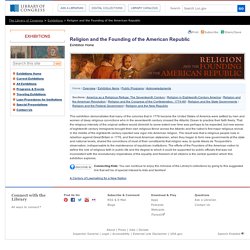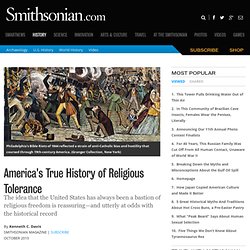

Religion and the Founding of the American Republic (Library of Congress Exhibition) This exhibition demonstrates that many of the colonies that in 1776 became the United States of America were settled by men and women of deep religious convictions who in the seventeenth century crossed the Atlantic Ocean to practice their faith freely.

That the religious intensity of the original settlers would diminish to some extent over time was perhaps to be expected, but new waves of eighteenth century immigrants brought their own religious fervor across the Atlantic and the nation's first major religious revival in the middle of the eighteenth century injected new vigor into American religion.
The result was that a religious people rose in rebellion against Great Britain in 1776, and that most American statesmen, when they began to form new governments at the state and national levels, shared the convictions of most of their constituents that religion was, to quote Alexis de Tocqueville's observation, indispensable to the maintenance of republican institutions. America's True History of Religious Tolerance. Wading into the controversy surrounding an Islamic center planned for a site near New York City’s Ground Zero memorial this past August, President Obama declared: “This is America.

And our commitment to religious freedom must be unshakeable. The principle that people of all faiths are welcome in this country and that they will not be treated differently by their government is essential to who we are.” In doing so, he paid homage to a vision that politicians and preachers have extolled for more than two centuries—that America historically has been a place of religious tolerance. It was a sentiment George Washington voiced shortly after taking the oath of office just a few blocks from Ground Zero.
But is it so? Divining America: Religion in American History, TeacherServe®, National Humanities Center. History Now. Bill Moyers Journal . The Church and State Debate. The debate over the Separation of Church and State stretches far beyond the political arena: into our nation's hospitals, our bedrooms, our scientific research facilities, which is what makes a basic understanding of the underlying facts of debate important. How well do you know the history of God and government in the United States? Learn about it below. Separation of Church and State: A First Amendment Primer. Speak Outs - Separation of Church and State: Does a cross on federal land violate the establishment clause?
Separation of Church and State: Does a cross on federal land violate the establishment clause? Atop a barren mountain in the vast deserts of California stands a white cross, a memorial to the veterans of World War I that was erected by the Veterans of Foreign Wars in 1934. Many have hiked to the cross, and many more have seen it from afar. The memorial even has been the site of Easter services from time to time. There is just one problem: The mountain, Sunrise Rock, is located in the Mojave National Preserve, a federal park. Some say that a cross on federal land violates the First Amendment’s establishment clause, which forbids the federal government from establishing or endorsing any religion. The memorial became the center of controversy 10 years ago, when a former park employee wanted to erect a Buddhist shrine next to the cross.
Supporters of the cross say Congress’ action was a good decision. Justice John Paul Stevens seemed skeptical, asking, "How can you say that? Mr. Church and State. The First Amendment of the Constitution makes certain guarantees of religious freedomEstablishment Clause: The government cannot establish any official religionFree Exercise Clause: The government cannot prohibit citizens from exercising their own personal religious beliefsMuch controversy has surrounded how to interpret the precise meanings of the two religious-freedom clausesWhen adopted in 1791, the First Amendment prohibited Congress from establishing a national church or passing laws restricting the free exercise of religion.
"Congress," the amendment says, "shall make no law respecting an establishment of religion, or prohibiting the free exercise thereof. " These brief clauses had little immediate impact in the new nation; in fact, as the various state governments were not restricted by the First Amendment, they continued to support favored churches and discriminate against religious dissenters, much as they had in the colonial past. Not really. Not really. Again: not really.